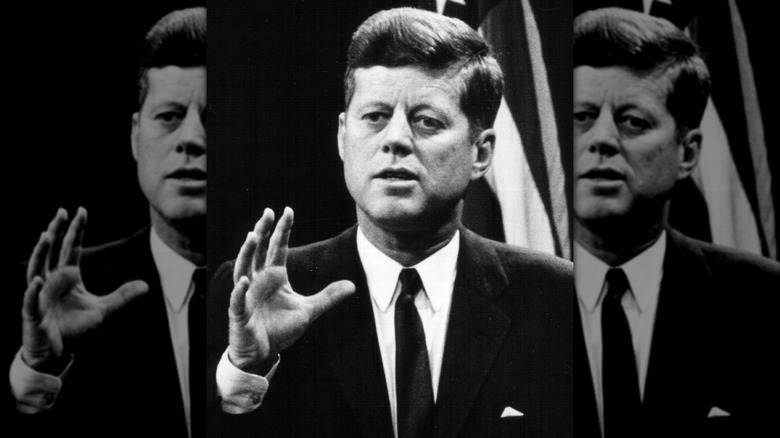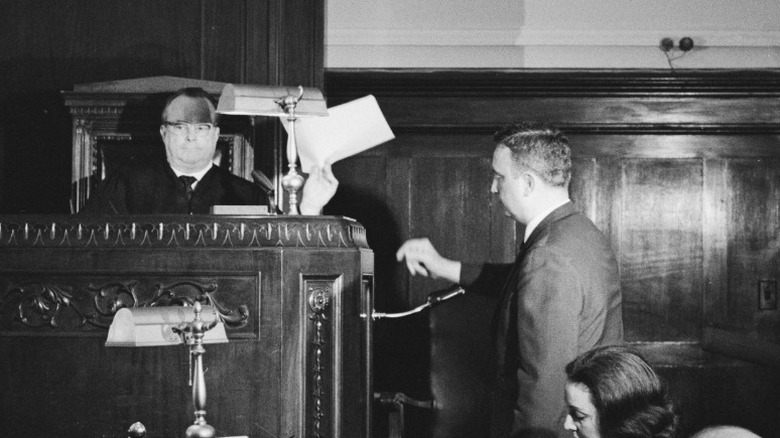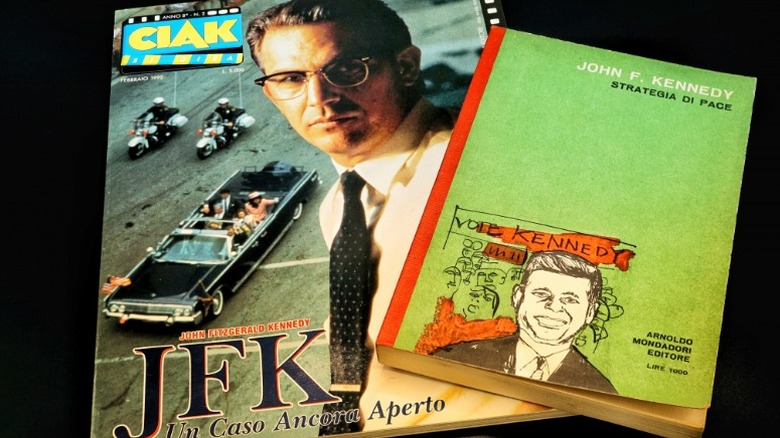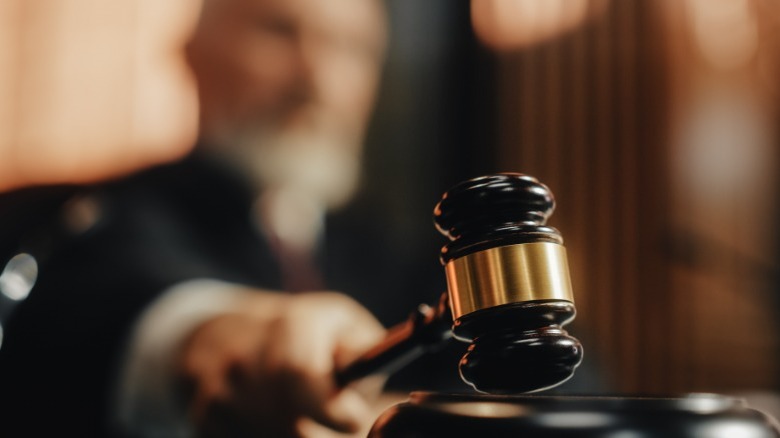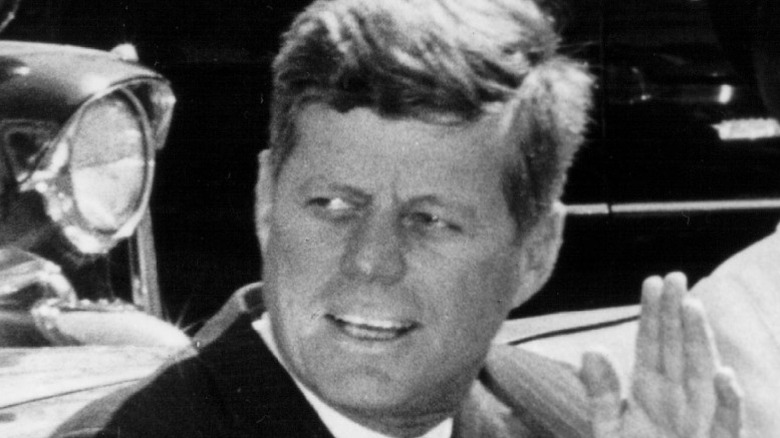Who Was Jim Garrison, The District Attorney At The Center Of A JFK Conspiracy Theory?
We may receive a commission on purchases made from links.
Many of those alive on that Friday morning in November 1963 can still recall the shock they felt when they heard the news of President John F. Kennedy being shot. In the days that followed his assassination, the world mourned the death of the young leader, watching tearfully as he was laid to rest on live television. The heartfelt image of his young son saluting the funeral procession on his third birthday broke hearts in millions of homes and is still revered as an iconic moment that helped define the end of the post-war innocence as the nation would soon shed its skin and plunge into one of its most tumultuous decades culturally.
The day before the funeral, the man widely believed to have fired the shots that killed Kennedy was himself murdered. Lee Harvey Oswald was being escorted by Dallas police to the county jail when nightclub owner Jack Ruby fired a shot from Cobra Colt Revolver into Oswald's abdomen (via History). As far as many in the world were concerned, the man who killed the 35th President of the United States lay dead.
A newly sworn-in President Lyndon Johnson appointed a commission to look into his predecessor's death. Named the Warren Commission, those tapped by the president began meeting and gathering information and evidence on December 5, 1963 and handed in their official report to the Oval Office the following September (via Britannica). The commission concluded that Oswald was the lone gunman and killer of Kennedy and that Ruby had acted alone in his murder of Oswald. But conspiracy theories are slow to die.
A Louisiana district attorney filed charges against Clay Shaw
One man who didn't buy into the Warren Commission's findings was New Orleans District Attorney Jim Garrison. All That's Interesting tells of how Garrison publicly decried the report as "totally false" and began to share his theory of how John F. Kennedy came to find himself on the bad end of a Carcano rifle. Garrison charged that Kennedy's assassination was part of a plot hatched by the CIA to keep the president from ending U.S. involvement in Vietnam.
Many felt that Garrison was just an attention seeker. But he proved to be more than just talk. He purported that a network of U.S. citizens had aided Lee Harvey Oswald in the act and formally accused New Orleans businessman Clay Shaw of conspiracy to kill the president. Shaw was indicted in 1967 and brought to trial. It took the jury but an hour to render a verdict of not guilty for Shaw, but the trial did have three important takeaways. First, the charge against Shaw led to multiple other conspiracy theories about the assassination of Kennedy that have given scores of deep rabbit holes for conspiracy theorists to dive into for nearly 60 years. The trial also marked the first time that the public ever saw the infamous Zapruder film, a home movie of the procession through Dallas that caught the moment Kennedy was shot on film. Years later, the trial also served as the focal point for one of legendary director Oliver Stone's epic films, "JFK," in 1991.
Garrison was born to practice law
Jim Garrison had law in his blood. His father and grandfather were both attorneys, and he would follow in their footsteps by earning his doctorate in law from Tulane University. Before his academic pursuits, Garrison enlisted in the U.S. Army in 1940 and stayed in active service until the end of World War II in 1945. The Los Angeles Times reports that Garrison flew as an enemy artillery spotter in the European theatre and was part of the unit that helped to liberate the horrific Dachau death camp.
After law school, Garrison wore a couple of different hats. He moved to Tacoma, Washington, where he worked as an FBI agent (per Spartacus Educational). But his calling was practicing law, and he soon returned to New Orleans to establish a legal practice. In the early 1960s, Garrison was beginning to make a name for himself in the city. In 1960, he launched his career in politics in an unsuccessful bid to win a seat on the bench as a judge (via The Washington Post). He did not give up his mission for elected office, however, and began eyeing the office of district attorney. The New York Times reports that Garrison blamed the rising crime rates in the city on Mayor Victor Schiro and the incumbent district attorney. Though a newcomer to the political world, his message resonated with a good number of voters in the Crescent City, and he won the election.
He became an accomplished author
The obsession Jim Garrison had with the JFK assassination did not end when the jury exonerated Clay Shaw. He would go on to pen three different books either about or based on the Kennedy assassination. In 1970, "A Heritage of Stone" was published (per Ratville Times). This book gives an in-depth look at the events leading up to and immediately following Kennedy's last day, as well as Garrison's own theories of who was really behind the assassination and how the purported plot to kill a world leader was carried out.
Garrison's next book was a work of fiction but was largely based on the Kennedy assassination. "The Star Spangled Contract" was released in 1976. This work follows an ex-CIA agent who uncovers a United States government plot to kill the sitting president (via Amazon). In 1988, "On the Trail of the Assassins" was published. This bestselling book details Garrison's charging Shaw for conspiracy but also lays out a case that the assassination of Kennedy was all part of an elaborate plot orchestrated by the CIA (per Amazon). Three years later, Oliver Stone would use this book in part to create his historical film "JFK." If you watch Stone's film closely, you can spot Garrison among the cast — he plays Chief Justice Earl Warren of the famed Warren Commission (via IMDb).
He later became a judge
Jim Garrison's career as an elected official had some ups and downs following the Clay Shaw trial. In 1971, he was arrested on federal charges of taking bribes to keep illegal pinball gambling rackets from being prosecuted (per The New York Times). Though a jury found him not guilty in a 1973 trial, the charges and media coverage of the court case were detrimental to Garrison's campaign for reelection. The Los Angeles Times reports that Garrison felt he was robbed of the necessary time to campaign to keep his seat, stating, "They sure got me. When they set that trial, that federal trial, for a few months before the election, they sure got me." On an unrelated but interesting note, the man who defeated Garrison was Harry Connick Sr., the father of musician and actor Harry Connick Jr.
But this defeat helped pave the way for his placement on the bench as a judge. Looking back at his failed reelection campaign for District Attorney, Garrison said (per the Los Angeles Times), "It was the best thing that ever happened to me, because I wouldn't have found my way into the 4th Circuit." The Los Angeles Times reports that Garrison was reelected to the 4th Circuit for a second 10-year term in 1988. He retired in 1991 after reaching the state's mandatory retirement age of 70 (per The Washington Post).
Garrison died of cancer in 1992 but left behind a legacy
After a long and storied career, Jim Garrison died shortly after he retired from the bench. The Washington Post reports that the lawyer, judge, actor, author, and conspiracy theorist died on October 21, 1992, at the age of 71. The New Yorker pointed out some interesting points about the legacy that Garrison left behind him. Notably, he was the only person to ever prosecute someone for assassinating John F. Kennedy.
Though Lee Harvey Oswald would most certainly have been brought to trial, Jack Ruby killed him shortly after his arrest. The Warren Commission Report did not implicate anyone else in the plot or the assassination. Garrison charging Clay Shaw was the only time that a courtroom had a defendant on trial for anything related to that tragic event from November 22, 1963. It could be argued that Garrison's take on Kennedy's death helped propel him to great successes later in life — certainly, a silver lining for at least one person on the dark cloud that hung over this nation following the death of one of its most revered leaders.
